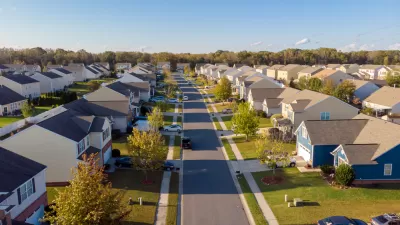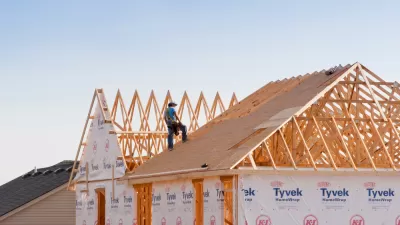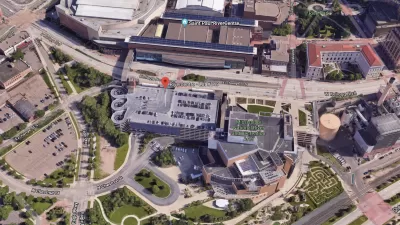Stephen Smith takes a look at land use regulations in Brazil, where developers are still required to make room for cars that its growing cities can't support.
Brazil is no stranger to the challenges facing global cities today. Simultaneously hailed for innovations like bus rapid transit and lamented for its squalid favelas, the country sits at the bleeding edge of urban policy.
And so it comes as a surprise that throughout the nation, Brazil's traffic woes are worsened by seemingly anachronistic minimum parking requirements. As Smith explains, "A few decades ago Brazil joined a number of developing nations in adopting American-style minimum parking requirements for new developments... While planners seek to make sure everyone who has a car has some place to park it, critics contend that rather than simply making room for those who will inevitably drive, the policies are actively encouraging motorization."
Brazil owes its auto-oriented policy in part to the legacy of modernist urban design, beginning in the middle of the last century. Planned in that tradition, the capital city of Brasília "eschewed the pedestrian-and-transit-oriented trappings of other cities. The city was originally envisioned... without sidewalks or stoplights on the main boulevards, and the abundance of cloverleaf intersections testifies to the city's original planners favoring of motor traffic over all else."
But the requirements do not reflect the reality of already-overtaxed streets in cities throughout Brazil, where critics argue that the needless parking takes away precious space and constrains better forms of growth. One commercial developer in São Paulo said, of developers' feelings about the requirements, "No, they are not happy, but it is what it is. It's the status quo, and no one questions it anymore."
Thanks to Stephen J. Smith
FULL STORY: As Traffic Snarls Brazil's Cities, Officials Plan For More Cars

Planetizen Federal Action Tracker
A weekly monitor of how Trump’s orders and actions are impacting planners and planning in America.

Map: Where Senate Republicans Want to Sell Your Public Lands
For public land advocates, the Senate Republicans’ proposal to sell millions of acres of public land in the West is “the biggest fight of their careers.”

Restaurant Patios Were a Pandemic Win — Why Were They so Hard to Keep?
Social distancing requirements and changes in travel patterns prompted cities to pilot new uses for street and sidewalk space. Then it got complicated.

Albuquerque Route 66 Motels Become Affordable Housing
A $4 million city fund is incentivizing developers to breathe new life into derelict midcentury motels.

DC Area County Eliminates Bus Fares
Montgomery County joins a growing trend of making transit free.

Platform Pilsner: Vancouver Transit Agency Releases... a Beer?
TransLink will receive a portion of every sale of the four-pack.
Urban Design for Planners 1: Software Tools
This six-course series explores essential urban design concepts using open source software and equips planners with the tools they need to participate fully in the urban design process.
Planning for Universal Design
Learn the tools for implementing Universal Design in planning regulations.
Heyer Gruel & Associates PA
JM Goldson LLC
Custer County Colorado
City of Camden Redevelopment Agency
City of Astoria
Transportation Research & Education Center (TREC) at Portland State University
Camden Redevelopment Agency
City of Claremont
Municipality of Princeton (NJ)





























